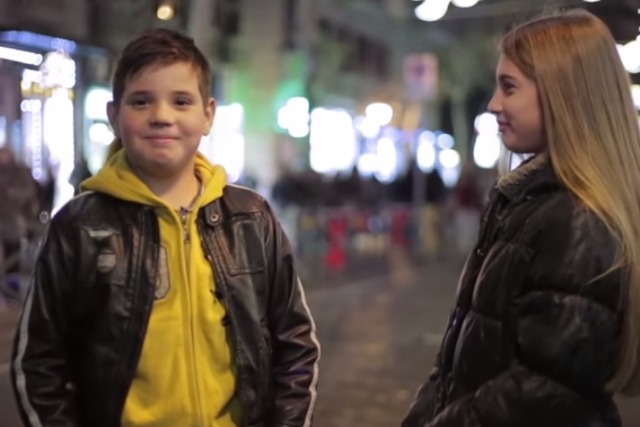
A video featuring young boys asked to slap young girls has unsurprisingly been attracting its fair share of headlines over the last few days.
But far from the latest horrendous internet craze, it’s a video with a very different purpose.
Created by online Italian newspaper Fanpage.it, the video aims to highlight the issue of violence by men against women by interviewing six boys between seven and 11 on a busy Italian street.
They are asked to give their names and ages and what they want to be when they grow up. They are then introduced to a pretty young girl named Martina and asked what they like about her (her hands and her shoes are the most popular!).
After pulling some funny faces, they are finally told by the interviewer to, "slap her...hard". Cue even more funny faces, as they stare at the interviewer clearly shocked, bemused and visibly upset.
'I'm a man'
When asked why not, one pipes up, "Why not? Because I'm a man'". It’s a heartwarming response which proves older really does not mean wiser - and one that has clearly resonated around the web.
Although primarily targeted at Italian viewers - where domestic abuse was called "the most pervasive form of violence" in the country by a 2012 United Nations report - the PSA has also attracted a lot of interest around the globe.
The video, launched on both Facebook and YouTube, has so far been shared almost 1.5m times since its launch on January 3, making it the second most shared online video around the world for the last seven days.
It’s a powerful watch, somehow packing in more emotions in three minutes than your average Hollywood tearjerker manages in two hours
But why is so successful? Well, firstly, it’s a powerful watch, somehow packing in more emotions in three minutes than your average Hollywood tearjerker manages in two hours. It shocks us, it amuses us, and ultimately it gives us hope for the future.
There's also something very moving about seeing the world through the eyes of a child. It can be uncomfortable and it can be challenging to come face to face with children's perspectives, which seem instinctively ‘true’ and force us to confront our own adult prejudices and behaviours that often go unchallenged or - as in the case of domestic violence - unseen.
Untainted by experience, children have the power to tear down cultural stereotypes and the moral authority to condemn behaviour they feel is intuitively wrong.
Fanpage is the first brand to take this approach in 2015, but it's by no means a new approach; it's a continuation of the trend for brands to release good cause videos, and especially #Fempowerment video ads, such as and #FCKH8’s that were huge hits last year.
In fact, eight out of the top 20 video ads last year were promoting social causes as well as selling products.
It's setting a high benchmark for emotional engagement at the start of 2015 and following on from the evocative, it's another indication that brands are looking to address social ills and build inter-generational bridges this year.
Read next


.jpg)


.jpg)